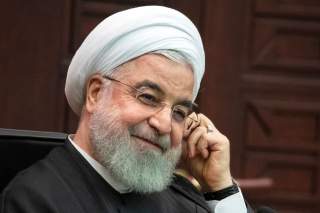Trump Won't Like This: Iran's Clever Strategy of Pushback Is Working
For a weak power, Iran is playing its hand well.
And just as Iran is not inclined to do Trump any political favors while buried under sanctions, Rouhani is also not about to shoot himself in the foot politically at home. With parliamentary elections approaching in February, Rouhani and his camp of moderates must carefully navigate a highly competitive political scene at a time when Iran's conservative hard-liners will portray any talks with Trump as sheer recklessness — especially if they are not accompanied with real sanctions relief.
But for Trump, sanctions against Iran are like tariffs against China: a tool to stretch and strangulate the adversary into submission. By that logic, he can scarcely abandon the tool that he uses to apply maximum pressure at the onset of talks; he can only do so as a means of enforcing demands once he strikes a deal. There is still a chance that Trump might bend and lift some sanctions to give some life to the French proposal. Indeed, recent leaks suggest that Bolton's abrupt departure followed a particularly tense meeting in which the participants discussed whether to ease sanctions. It is also quite notable that Treasury Secretary Steven Mnuchin, a White House moderate, is assuming a more prominent role on Iran policy in the wake of Bolton’s exit.
On the other hand, now that Iran has been coaxed into a conversation with the French over a substantial credit line, Trump may interpret Iran's interest and the flicker of negotiation as a sign, at long last, of Tehran's capitulation and a sign to double down on his maximum pressure sanctions strategy to score the deal he wants. Mnuchin implied as much when he reiterated that "we are maintaining the maximum pressure campaign" when asked if the White House would grant oil waivers. Under such circumstances, Rouhani is hardly likely to accept an invitation to meet with Trump. Cue, accordingly, the continuing stalemate.
A Proven Recipe for Breaking Stalemates
Iran, however, has already shown its willingness to go to great lengths to break a stalemate when the situation warrants. Its brazen behavior this summer succeeded in pushing Trump to the brink of war and forced him to internalize one of his worst presidential nightmares: drowning the United States in yet another military quagmire in the Islamic world that would likely derail a fragile global economy and crush his reelection bid. All the pieces remain in place for Iran to resurrect a military threat in the Persian Gulf. And this time, French mediators already have a proposal — which includes a component to ease sanctions — ready to present to Trump as his ticket to avoid war.
As the Rouhani government strives to avoid burning bridges with Europe and keep a lid on domestic dissent at worsening economic conditions, Tehran is unlikely to attack with the same frequency as it did during the summer or proceed with anything but caution in reactivating its nuclear work. Even so, it has an array of options to revive the specter of military conflict, especially as there are already a number of variables in play that could raise the threat of confrontation in the months ahead. The United States and others are operating from a much more assertive military posture in the region following the summer tanker attacks, enabling them to respond more rapidly to potential Iranian raids while also raising the risk of direct clashes. The White House may also find it harder to de-escalate tensions with Israel in the way. The Israeli government is going the extra mile to keep the pressure on Iran and spoil the potential for negotiations while it still can count on a friendly and pliable president in the White House. In just the past couple of months, Israel appears to have significantly expanded the scope of its strikes against Iran-backed proxies in Iraq and Lebanon. If U.S. forces in Iraq become targets for Iranian retaliation against Israeli strikes, the White House could find itself on a path to escalation with Iran, even as it wishes to avoid such a road.
In the end, the tepid diplomacy between the United States and Iran, along with the relative quiet that has descended on the Persian Gulf in recent weeks, should not be taken for granted. While there is a small window for a diplomatic opening, a flurry of negotiating attempts at the U.N. General Assembly still runs a good chance of ending in a stalemate if the White House does not soon relent on sanctions. If another stalemate returns, Iran may be compelled to deliver another wake-up call to an American president who is trying desperately to end wars and score some foreign policy wins to buttress his 2020 reelection bid.
Iran May Be Weak, But Its Strategy Is Working is republished with the permission of Stratfor Worldview, a geopolitical intelligence and advisory firm.
Image: Reuters.

